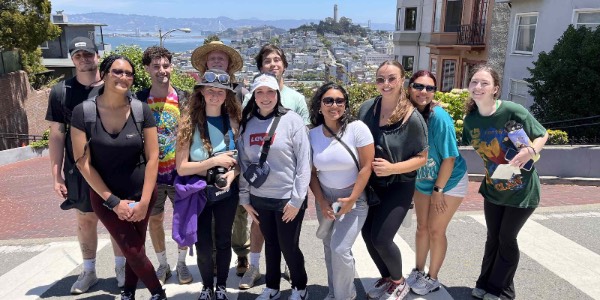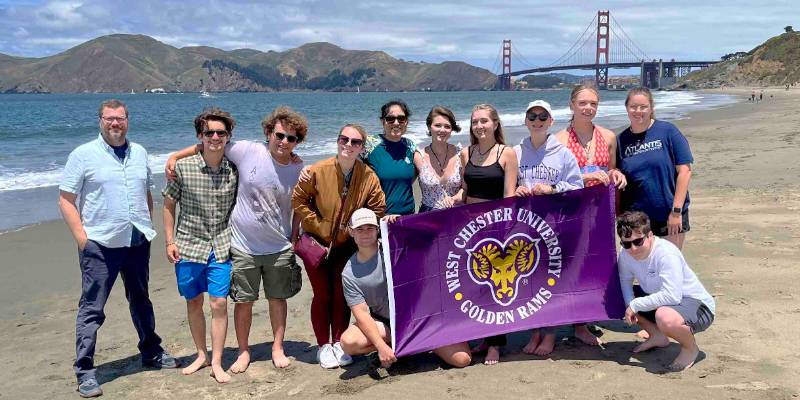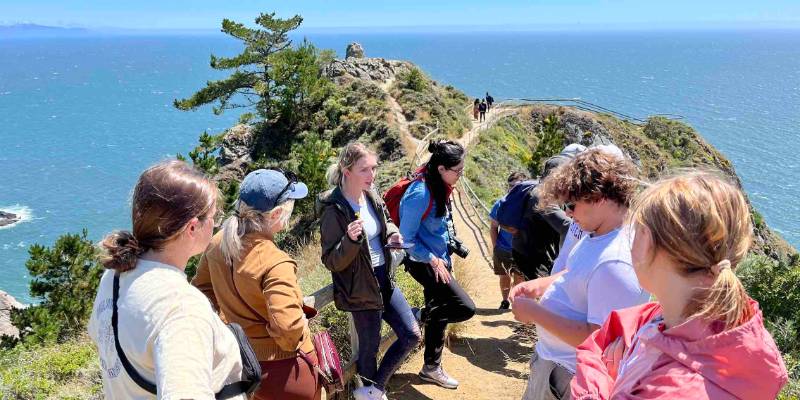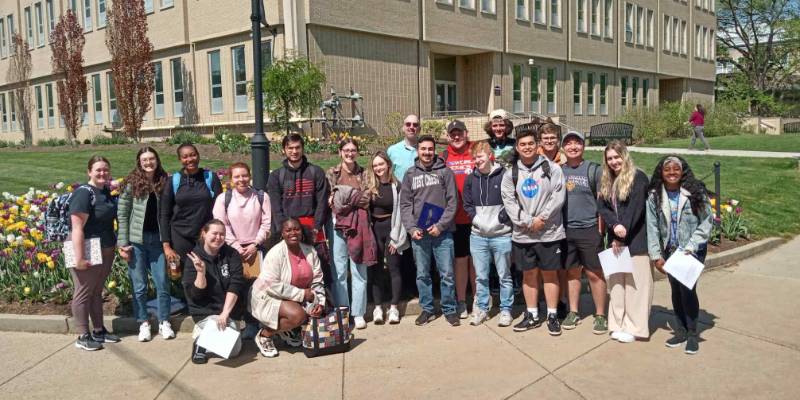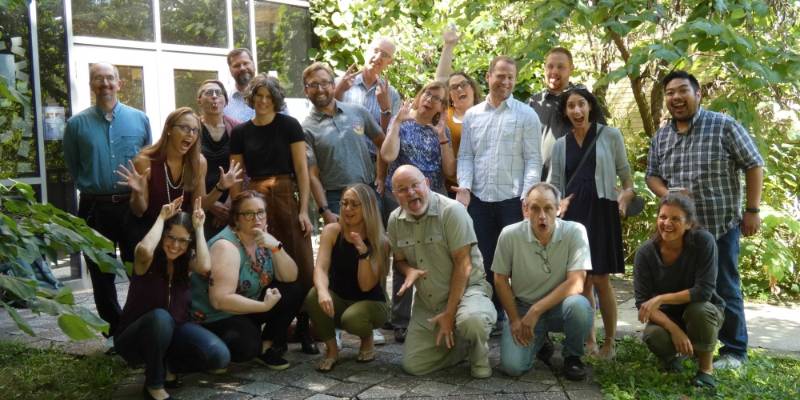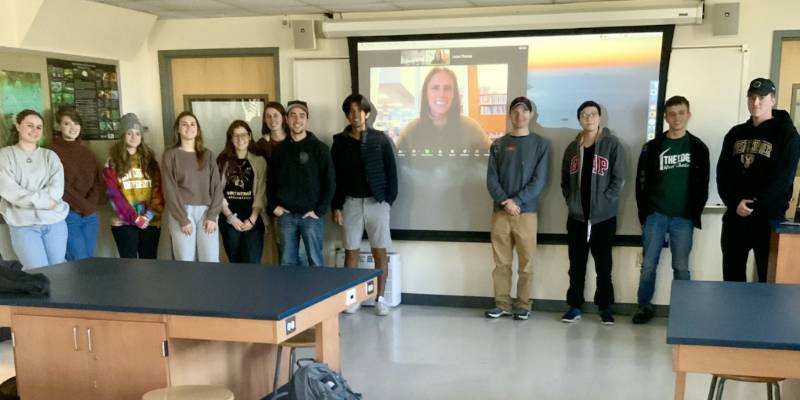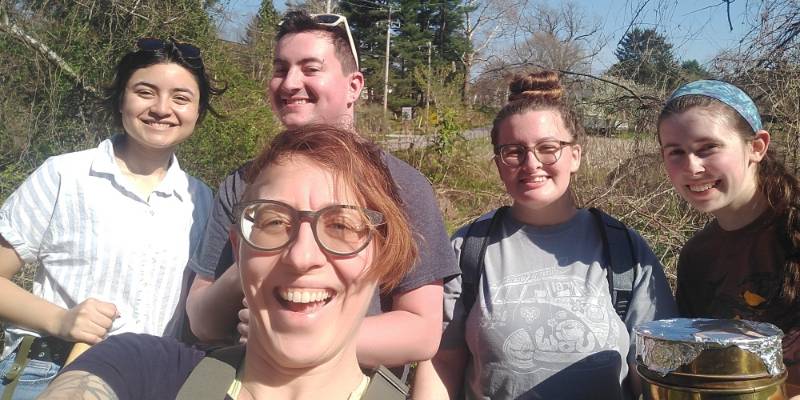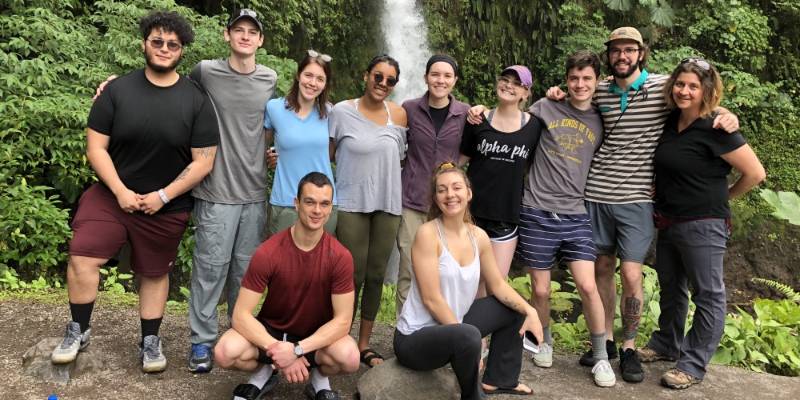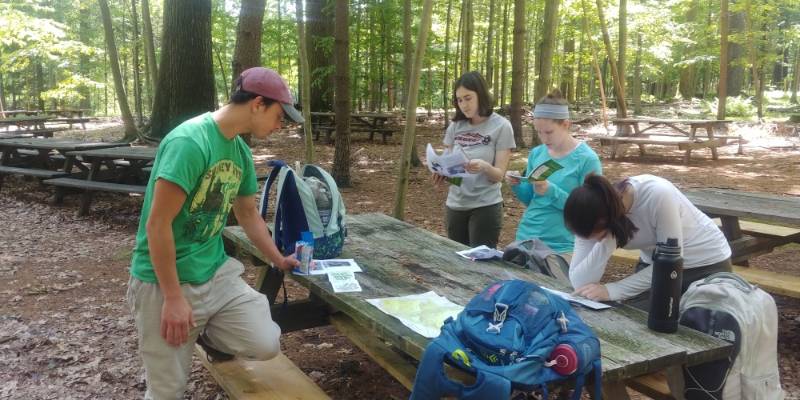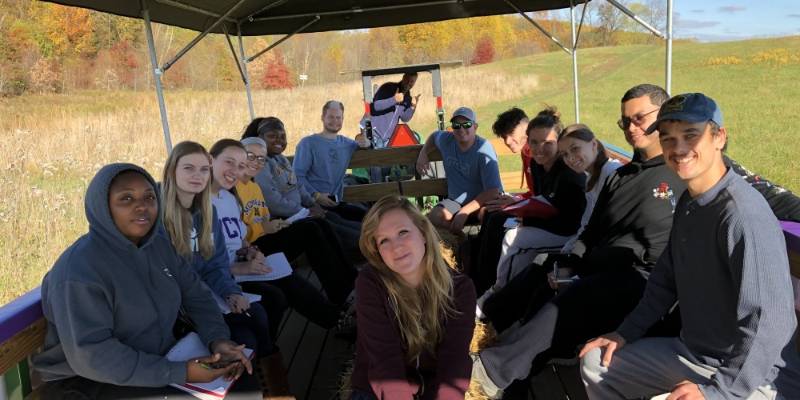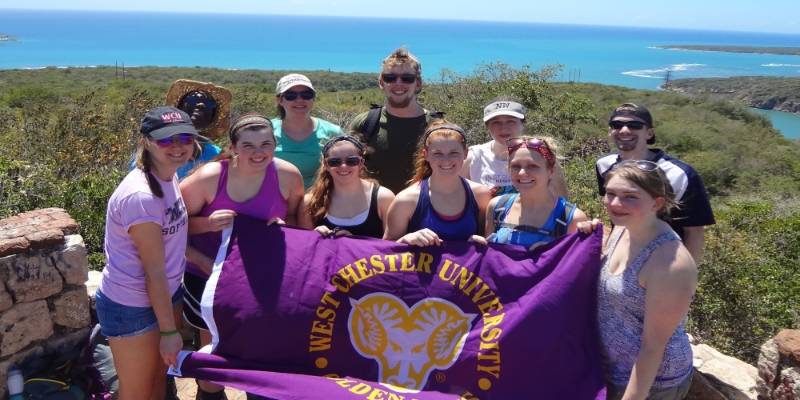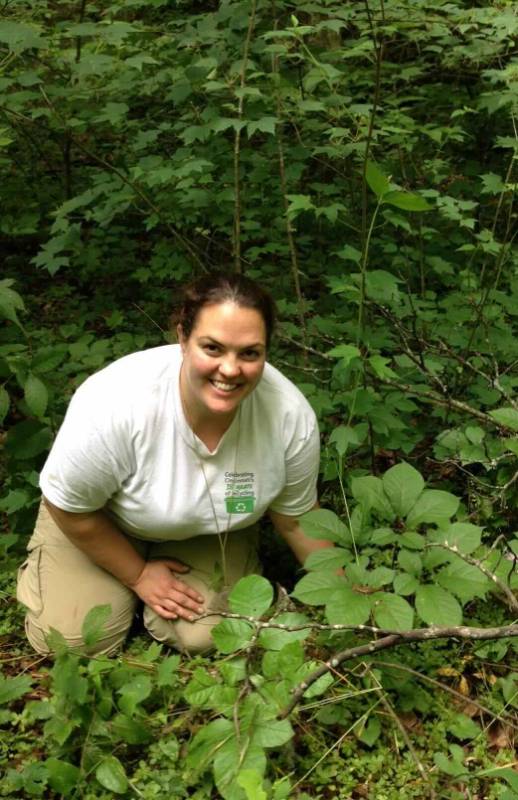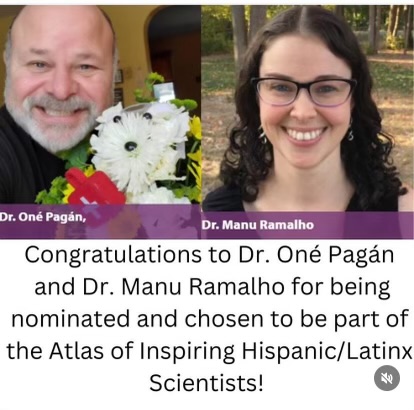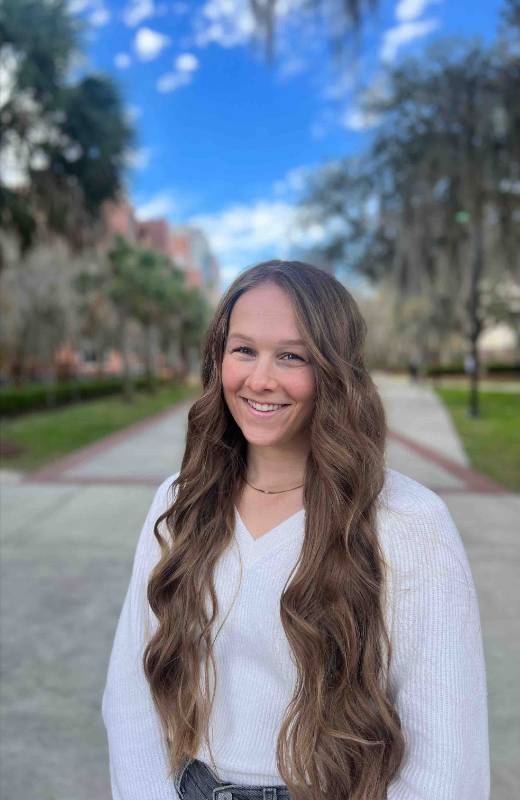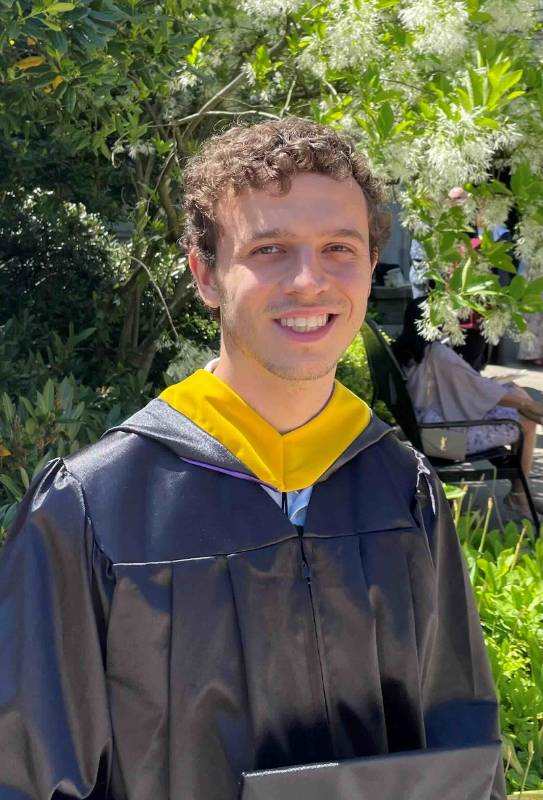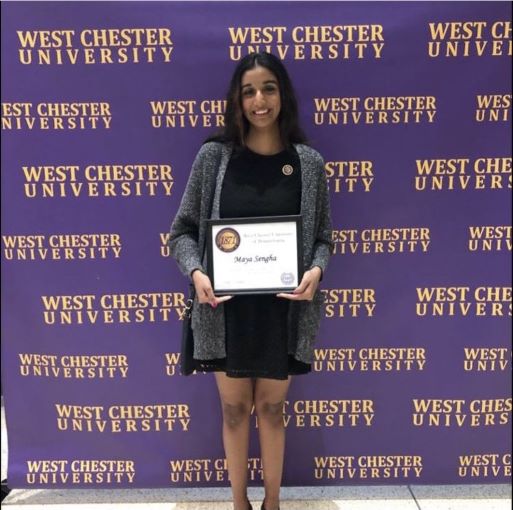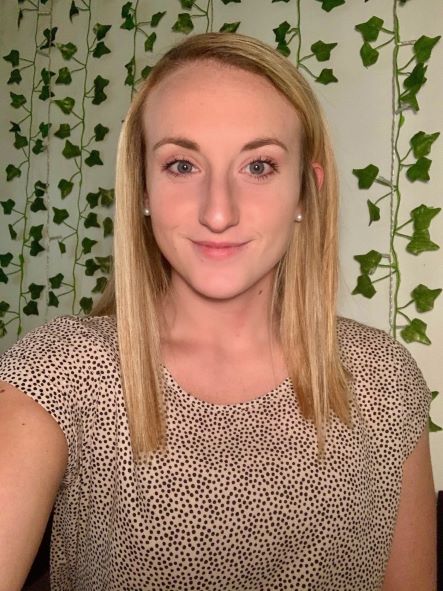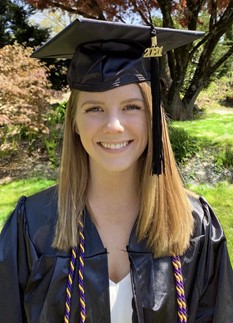Student Development Calendar
02/16 Requirements to apply for grad school; Tips for GRE tests, Rec Letters, CVs & Resumes
Requirements to apply for grad school; Tips for GRE tests, Rec Letters, CVs & Resumes
Program: Biology Grad School 101: Navigate Your Next Steps
Date: 02/16/2026
Time: 5:00pm
Location: Merion 109
Facilitators: Dr. Ben Chambers and Dr. Jenny Uehling
03/23 - Feedback on CVs & Resumes; Tips for Personal & Research Statements
Feedback on CVs & Resumes; Tips for Personal & Research Statements
Program: Biology Grad School 101: Navigate Your Next Steps
Date: 03/23/2026
Time: 5:00pm
Location: Merion 109
Facilitators: Dr. Ben Chambers and Dr. Jenny Uehling
04/27 - Feedback on Personal & Research Statements; Interview prep suggestions
Feedback on Personal & Research Statements; Interview prep suggestions
Program: Biology Grad School 101: Navigate Your Next Steps
Date: 04/27/2026
Time: 5:00pm
Location: Merion 109
Facilitators: Dr. Ben Chambers and Dr. Jenny Uehling
Full Schedule
Is biology grad school right for you?; Master’s vs. PhD programs
Program: Biology Grad School 101: Navigate Your Next Steps
Date: 09/29/2025
Time: 5:00pm
Location: Merion 113
Facilitators: Dr. Ben Chambers and Dr. Jenny Uehling
Different routes to grad school; How to get effective research experience
Program: Biology Grad School 101: Navigate Your Next Steps
Date: 10/27/2025
Time: 5:00pm
Location: Merion 109
Facilitators: Dr. Ben Chambers and Dr. Jenny Uehling
Identifying grad programs of interest; Inquiry emails
Program: Biology Grad School 101: Navigate Your Next Steps
Date: 11/17/2025
Time: 5:00pm
Location: Science Complex North 191
Facilitators: Dr. Ben Chambers and Dr. Jenny Uehling
Requirements to apply for grad school; Tips for GRE tests, Rec Letters, CVs & Resumes
Program: Biology Grad School 101: Navigate Your Next Steps
Date: 02/16/2026
Time: 5:00pm
Location: Merion 109
Facilitators: Dr. Ben Chambers and Dr. Jenny Uehling
Feedback on CVs & Resumes; Tips for Personal & Research Statements
Program: Biology Grad School 101: Navigate Your Next Steps
Date: 03/23/2026
Time: 5:00pm
Location: Merion 109
Facilitators: Dr. Ben Chambers and Dr. Jenny Uehling
Feedback on Personal & Research Statements; Interview prep suggestions
Program: Biology Grad School 101: Navigate Your Next Steps
Date: 04/27/2026
Time: 5:00pm
Location: Merion 109
Facilitators: Dr. Ben Chambers and Dr. Jenny Uehling
News
2025 Highlights
Dr. John Pisciotta and WCU alum Chase Weikel published an article titled "Recreational facilities as reservoirs for multidrug-resistant Staphylococcus aureus" in Microbiology & Immunology. 2025. Mar;69(3):168-173.
Dr. John Pisciotta received a $1,500 grant titled "Local Production of Nematode Predators of the Small Hive Beetle (SHB) Aethina tumida from the Chester County Beekeepers Association.
Dr. John Pisciotta and former WCU graduate students Samantha Blessing and Zehra Zaybak co-authored a book chapter titled "Wastewater Composition and Treatment Using Conventional and Bioelectrochemical Systems" in Biotechnology for Environmental Sustainability. Springer Publishing. 2025. ISBN: 978-981-97-7220-9
Dr. Chandler and her colleagues published the article "Reassessing adaptational lag in Eriophorum vaginatum: short-term responses to reciprocal transplant and passive warming experiments in northern Alaska" in the journal Arctic Science (https://doi.org/10.1139/as-2025-000)
Dr. Oné Pagán published a manuscript with three students and two faculty colleagues as coauthors: Behavioral and toxic effects of the neonicotinoid pesticide thiacloprid in the planarian Girardia dorotocephala. Martínez-Villalpando SG, Snyder E, Harris N, Fork M, Turner G, Pagán OR. Environ Toxicol Pharmacol. 2025 Sep 9;119:104816. doi: 10.1016/j.etap.2025.104816.
Dr Frank Fish, biology, presented an invited seminar, "Biomimetics, Inspiration, Tubercles, and Business”, to the University of California, Berkeley, Sutardja Center for Entrepreneurship & Technology, Bioinspired Innovation Course on September 9 (2025).
Dr. Frank Fish, biology, published a research paper "Hydrodynamic function of the cephalic lobes of the myliobatoid rays for swimming stabilization” in the Journal of Morphology 286: e70085 (2025). Former WCU undergraduate and graduate student Molly Gabler-Smith was a co-author on the paper.
Dr. Manu Ramalho published the following manuscript: GIANARIS, A.*, ROCHA, F. P., PINHEIRO, Y. V. F., BUENO, O. C., RAMALHO, M. O., & MARTINS, C. Advances in understanding the microbiota of ants in Brazil: Review and future perspectives. 2025. In Formigas do Brasil. Accepted.
Dr. Manu Ramalho published the following manuscript: FLYNN, P. J. & RAMALHO, M. O. Unveiling the bacterial world of ants (Hymenoptera: Formicidae): a systematic review of patterns, drivers, and evolutionary insights. Myrmecol. News. 2025. DOI: https://doi.org/10.25849/myrmecol.news_035:211
Dr. Manu Ramalho published the following manuscript: KELLEHER, L. A.*, & RAMALHO, M. O. Impact of rising temperatures on the bacterial communities of Aphaenogaster ants. Biology Open, bio-062145. 2025. DOI: https://doi.org/10.1242/bio.062145
Dr. Manu Ramalho published the following manuscript: KELLEHER, L. A.*, & RAMALHO, M. O. Impact of Species and Developmental Stage on the Bacterial Communities of Aphaenogaster Ants. Current Microbiology, 82(4), 157. 2025. DOI: https://doi.org/10.1007/s00284-025-04128-x
Dr. Manu Ramalho published the following manuscript: MEIRELES, S. F.*; RAMALHO, M. O.; MONTENEGRO, H.; NETO, J. F. N.; DA SILVA, J. S.; ROQUE, R. A.; RAFAEL, M. S. Do the microbiota of larval breeding site and the blood meal influence the composition and diversity of bacterial communities in the midgut of Mansonia humeralis (Diptera: Culicidae) from the western Amazon? Brazilian Journal of Microbiology, 2025. DOI: https://doi.org/10.1007/s42770-025-01623-y
Dr. Manu Ramalho published the following manuscript: BOROWIEC M.L.; ZHANG, M.Y.; NEVES, K.; RAMALHO, M. O.; FISHER, B. L.; LUCKY, A.; MOREAU, C. S. Evaluating UCE Data Adequacy and Integrating Uncertainty in a Comprehensive Phylogeny of Ants, Systematic Biology, 2025, syaf001, https://doi.org/10.1093/sysbio/syaf001
Biology undergraduate Gianna Parrish presented a poster titled "Influence of Trash Substrate on Biofilm Growth and Metabolic Activity in Urban Streams" at the Society for Freshwater Science Annual Meeting (18-22 May 2025. San Juan, Puerto Rico), co-authored by Dr. Megan Fork.
Dr. Megan Fork presented work titled "Environmental conditions explain variability in concentrations of nutrients but not emerging contaminants" at the Ecological Society of America Annual Meeting (10-15 August 2025. Baltimore, MD), co-authored by Drs. Jerker Fick, AJ Reisinger, Peter Groffman, and Emma Rosi.
Biology undergraduate Evie Myers presented a poster titled "Method Development and Comparison of Methods for Quantifying Total Phosphorus in Goose Creek" at the Annual Meeting of the Mid-Atlantic Chapter of the Ecological Society of America (5 April 2025. Longwood Gardens, PA), co-authored by Dr. Megan Fork.
Biology Master's student Victoria Moreira presented work titled "Effects of Single-Use Plastic Bans on Anthropogenic Litter in Urban Streams in Southeastern Pennsylvania" at the Society for Freshwater Science Annual Meeting (18-22 May 2025. San Juan, Puerto Rico), co-authored by Dr. Megan Fork.
Dr. Megan Fork presented work titled "Barriers to conference participation for environmental scientists from diverse organizations" at the Society for Freshwater Science Annual Meeting (18-22 May 2025. San Juan, Puerto Rico) with co-authors Dr. Adrienne Sponberg, Dr. Jane Rogosch, Dr. Christi Nam, Dr. Bethany Laursen, and Lauren Kuehne.
Dr. Megan Fork presented work titled "West Chester (PA) salt snapshot: A transdisciplinary collaborative synoptic sampling of road salt pollution" at the Seventh Symposium on Urbanization and Stream Ecology (SUSE7; 13-16 May 2025. San Juan, Puerto Rico) together with scientists from the Stroud Water Research Center (Dave Bressler, Dr. Jen Merrill, and Dr. John Jackson).
Dr. Megan Fork published the following paper: Fork, M.L., J. Fick, A. J. Reisinger, P. M. Groffman, and E. J. Rosi. 2025. Environmental conditions explain variability in concentrations of nutrients but not emerging contaminants. Ecosphere. DOI: 10.1002/ecs2.70225
Dr. Oné Pagán published the following manuscript: Pagán 2025. Parthenolide acts as a cocaine antagonist in the human dopamine transporter. microPublication Biology. 10.17912/micropub.biology.001720.
Dr. Frank Fish, biology, presented an invited seminar "Creation of innovative technologies based on bio-inspired designs from marine animals” to the Bioinspired Design class at Georgia Tech, September 15 (2025).
Dr. Frank Fish, biology, was a co-author on a paper, "The key to bubble-net feeding: how humpback whale morphology functionally differs from other baleen whales” published in the journal of Experimental Biology 228: jeb249607 (2025), doi:10.1242/jeb.249607. The paper was co-authored with former WCU graduate student Dr. William Gough of the University of Hawaii.
Dr. Oné Pagán and Dr. John Pisciotta co-authored the following article with two Biology Students (Enrique Mentado-Sosa and Juan Miguel Guerra-Solano): Mentado-Sosa, E., Guerra-Solano, J. M., Raffa, R. B., Pagán, O. R., Pisciotta, J., Pagán, O. R., & Pisciotta, J. M. (2025). Microbiome Alteration Prevents Abstinence-Induced Nicotine Withdrawal in a Well-Established Planarian Model. Cureus, 17(7).
Dr. Frank Fish, biology, co-authored an article, “Tuning body shape and stiffness to reduce water slamming forces”, in Ocean Engineering, volume 339: 121655 (2025). The article was co-authored with Dr. Ed Habtour of the University of Washington and Dr. Tadd Truscott of the King Abdullah University of Science and Technology, Saudi Arabia.
Dr. Frank Fish, biology, gave two invited presentations at the Office of Naval Research Bio-Inspired Autonomous Systems and Soft Robotics Review on May 28, 2025 that was held at George Washington University, Washington, D.C. The presentations were “Unmanned biorobotic systems in high energy environments: Biologic to robotic navigation through, and transitions from the littoral zone” that was co-authored with Drs. James Tangorra and Harry Kwatny from Drexel University and Megan Leftwich from George Washington University, (To be presented at and “Towards a deep water amphibious robotic turtle” that was co-authored with Rebecca Kramer from Yale University.
Alex Cesari, biomedical engineering undergraduate, published a research paper, “Comparative mechanical and elastic properties of the dorsal and ventral tendons in the peduncle of harbor porpoise (Phocoena phocoena)”, in Journal of Experimental Biology (2025) 28, jeb249621. The paper was co-authored with Dr. Jesse Placone, biomedical engineering, Dr. Nicole Ramo, biomedical engineering, Dr. Michael Rosario, biology, Matthew Morris, biomedical engineering undergraduate, Danielle Adams, biology graduate student, and Dr. Frank Fish. The research was funded by the Office of Naval Research.
Dr. Frank Fish, Biology, co-authored the paper “Amphibious robotic dog: Design, paddling gait planning, and experimental characterization” that was published in the journal Biomimetics and Bioinspiration 20: 036012 (2025).
Dr. Frank Fish (biology) presented a paper, “Function of the upper jaw of rorquals to stabilize and maintain trim during lunge-feeding” at the NorthEast Regional Vertebrate Evolution Symposium (NERVES) at SUNY Stony Brook, NY on April 11, 2025. The paper was co-authored with Sophia Sebo (biology graduate student), William Gough (former biology graduate student, University of Hawaii), Jean Potvin (Saint Louis University), Paolo Segre (University of Wisconsin, Green Bay), Keith Moored (Lehigh University), and Jeremy Goldbogen (Stanford University).
Kim Samar, an undergraduate researcher in Jessica Sullivan-Brown’s lab was awarded a Society for Developmental Biology Regional Conference Travel Award (at University of Richmond) for presenting her poster on identifying different RNA transcripts of the folic acid metabolism gene, mel-32, in the roundworm C. elegans. She was also recently awarded the Fall 2024 CSM undergraduate research award for this work.
Dr. Frank E. Fish, biology, presented an invited talk, “Development of bio-inspired amphibious AUVs based on the morphological and swimming kinematics of secondarily aquatic vertebrates,” at SPIE, Smart Structures+Nondestructive Evaluation meeting in Vancouver, Canada, March 17-20, 2025. The presentation was co-authored with Dr. Rebecca Kramer-Bottiglio (Yale University), Dr. Megan Leftwich (George Washington University), and Dr. James Tangorra and Dr. Harry Kwatny (Drexel University).
Dr. Frank Fish, biology, presented a talk “Morphing transitions in an amphibious turtle inspired vehicle,” at the Office of Navel Research (ONR) Unmanned Marine Systems Technology (UMST) 2025 Program Review in Smyrna, Ga, January 27-31, 2025.
Dr. Frank Fish. Biology, presented “Delta winged shaped upper jaw acts as a control surface to stabilize whales during lunge-feeding” at the Annual Meeting of the Society for Integrative and Comparative Biology, in Atlanta GA, on January 3-7 (2025).
Dr. Frank Fish. Biology, presented “Porpoising and plunge diving at an acute angle” at the Annual Meeting of the Society for Integrative and Comparative Biology, in Atlanta GA, on January 3-7 (2025).
Dr. Frank Fish. Biology, co-authored a presentation, “Analyzing turning dynamics of a sea turtle-inspired robot on terrestrial environments” with Nnamdi Chikere and Dr. Yasmin Ozkan-Aydin of Notre Dame University.
Sophia Sebo, Biology graduate student, presented “The hydrodynamics of the streamlined body of sea lions” at the Annual Meeting of the Society for Integrative and Comparative Biology, in Atlanta GA, on January 3-7 (2025). The paper was co-authored with Drs. Frank Fish of West Chester University, Duncan Irschick of the University of Massachusetts, and Megan Leftwich of George Washington University.
Sophia Sebo, Biology graduate student, presented a talk, “Hydrodynamic roles of fore and hindflippers in harp and harbor seals” at the Annual Meeting of the Society for Integrative and Comparative Biology, in Atlanta GA, on January 3-7 (2025). The paper was co-authored with Drs. Frank Fish of West Chester University, and Megan Leftwich of George Washington University.
David Kramer, Biology graduate student, presented a talk, “Comparative hydrodynamics of the shells of aquatic, semi-aquatic and terrestrial turtles” at the Annual Meeting of the Society for Integrative and Comparative Biology, in Atlanta GA, on January 3-7 (2025). The paper was co-authored with Drs. Frank Fish of West Chester University, and Kramer-Bottiglio of Yale University.
2024 Highlights
Dr. Frank Fish. Biology, co-authored a talk, “Effects of flipper design on humpback whale turning performance” that was presented at the 25th Biennial Meeting of the Society of Marine Mammalogy, November 11-15, 2024 in Perth, Australia.
Dr. Pisciotta and former WCU BS student Jessica Buchser presented a poster titled "Antimicrobial
Efficacy of Zinc Oxide Nanoparticles on Pseudomonas aeruginosa and Staphylococcus
aureus ESKAPE Pathogen Coculture"at the American Society for Microbiology’s (ASM)
National Microbe Research Conference on June 15th 2024 in Atlanta, Ga.
Dr. Pisciotta and former WCU BS students Jessica Buchser and Kevin Phillips presented a poster
titled "Influence of Blood Proteins on Copper Silicone Nanoparticle-Mediated Inhibition
on Staphylococcus aureus" at the American Society for Microbiology’s (ASM) National
Microbe Research Conference on June 14th 2024 in Atlanta, Ga.
Dr. Pisciotta presented an invited talk titled "Smallpox at Valley Forge: Washington’s Campaign
Against an Infectious Killer" to the Chester County History Center on April 23, 2024
in West Chester, Pa.
Dr. Frank Fish, Biology, presented a keynote talk titled, “ Whales to Windmills” for Engineering Tomorrow apart of their Lab Day Event on Renewable Energy: Building Solar & Wind Systems (November 13, 2024). Engineering Tomorrow is a nonprofit educational group that offers interactive virtual engineering labs to schools, teachers, and high school students. From schools around the country, 2,458 students attended the presentation live, and 7,265 students registered to receive a recording of the presentation.
Dr. Oné Págan published the following paper: Ruble M, Simpson N, Smith B, Adeshina W, Snyder E, Pagán OR. Cotinine influences the effect of high and low nicotine concentrations on planarian motility differently. Neurosci Lett. 2024 Oct 15;841:137955. doi: 10.1016/j.neulet.2024.137955.
Dr. Oné Págan published the following paper: Kakuturu J, O'Brien M, Pagán OR. Schild Analysis of the Interaction between Parthenolide and Cocaine Suggests an Allosteric Relationship for Their Effects on Planarian Motility. Biomolecules. 2024 Sep 18;14(9):1168. doi: 10.3390/biom14091168.
Dr. Oné Págan published the following paper: Pagán OR. The complexities of ligand/receptor interactions: Exploring the role of molecular vibrations and quantum tunnelling. Bioessays. 2024 May;46(5):e2300195. doi: 10.1002/bies.202300195.
Dr. Frank Fish, biology, was a co-author on a paper, Robots that evolve on demand, that was published on-line in Nature Reviews Materials (2024), https://doi.org/10.1038/s41578-024-00711-z. The paper was co-authored with Dr. Rebecca Kramer-Botttiglio of Yale University.
Dr. Frank Fish, biology, received a three-year grant from the Office of Naval Research on “Towards a Deep Water Amphibious Robotic Turtle” that is in collaboration with Yale University.
Dr. Frank Fish, biology, received a three-year grant from the Office of Naval Research on “Unmanned Biorobotic Systems in High Energy Environments: Biologic To Robotic Navigation Through, and Transitions From, The Littoral Zone. This grant is in collaboration with George Washington University and Drexel University.
Dr. Frank Fish, biology, co-authored an invited presentation “Locomotion and transitions of an amphibious system: Biologic to robotic” at the ONR Bio-Inspired Autonomous Systems Review, May 22-24, 2024 at George Washington University, Washington, DC. The presentation was co-authored with Dr. Megan Leftwich of George Washington University and Drs. James Tangorra and Harry Kwatny of Drexel University.
Dr. Frank Fish, biology, co-authored an invited presentation “Autonomous environmental transitions of an amphibious turtle inspired robot” at the ONR Bio-Inspired Autonomous Systems Review, May 22-24, 2024 at George Washington University, Washington, DC. The presentation was co-authored with Dr. Rebecca Kramer-Bottiglio of Yale University.
Dr. Frank Fish, biology, received a grant from the Office of Naval Research for $379,961 to work on the biomechanics of sea turtles and tortoises for the development of an amphibious bio-robotic autonomous underwater vehicle with Yale University.
Dr. Frank Fish, biology, received a grant from the Office of Naval Research for $299,962 to work on the biomechanics of sea lions and other pinnipeds for the development of an amphibious bio-robotic autonomous underwater vehicle with George Washington University and Drexel University.
Dr. Manu Ramalho recently appeared on the Matters Microbial podcast, episode #32, discussing "What's bugging ants, microbially speaking?" You can listen to the episode here: https://www.microbe.tv/mm/mm-032/
Biology graduate student Amanda Munshower won third place in the Graduate Poster Presentations category at the Mid-Atlantic Ecological Society of America Conference for her research titled "Evolving Partnerships: A Multi-Stage Analysis of Host-Microbe Dynamics in the Life Cycle of the Spotted Lanternfly (Lycorma delicatula)." The presentation was co-authored by Dr. Manu Ramalho, Dr. Jennifer Chandler, and Dr. Teresa Donze-Reiner. Go Team!
Dr. Frank Fish, biology, co-authored a published research paper, “Diving dinosaurs? Caveats on the use of bone compactness and pFDA for inferring lifestyle” in PloS ONE 19(3): e0298957 (2024). [https://doi.org/10.1371/](https://doi.org/10.1371/) journal.pone.0298957 . The article was co-authored with Dr. Paul Sereno of the University of Chicago and Dr. Donald Henderson of the Royal Tyrrell Museum of Palaeontology.
David A. Kramer (Biology graduate student) published the scientific research paper, “Thrust production and chordal flexion of the flukes of bottlenose dolphins performing tail stands at different efforts” in the Journal of Experimental Biology 227: jeb246228 (2024). The paper was co-authored with Dr. Maura Sheehan (Health, emerita) and Dr. Frank Fish (Biology).
Dr. Frank Fish, biology, presented a guest lecture “Control surfaces of marine mammals” to the Functional Anatomy class in the Biology Department of Texas A&M university, Corpus Christi on February 23, 2024.
Dr. Frank Fish, biology, published the research article, Spin-leap performance by cetaceans is influenced by moment of inertia.,” in the _Journal of Experimental Biology_ vol. 227: jeb 246433 (2024). The article was co-authored with Dr. Anthony Nicastro, Physics Emeritus, Kaitlyn Cardenas, former WCU biology undergraduate, Dr. William Gough, former WCU graduate student, Dr. Judy St. Leger of SeaWorld, and Drs. Paolo Segre, Shirel Kahane-Rapport, and Jeremy Goldbogen of the Hopkins Marine Lab of Stanford University.
Dr. Frank Fish, biology, presented an invited seminar, “Creation of Innovative Technologies Based on Bio-Inspired Designs from Marine Animals” to aerodynamics students in the University of Washington Aeronautics and Astronautics Department on January 3, 2024.
Dr. Manu Ramalho and other collaborators have published a new paper on Wolbachia and turtle ants! Check out the paper here: https://doi.org/10.3390/biology13020121
Mission Statement
The primary mission of the Department of Biology, including its faculty, staff, and administrators, is to provide a high quality educational experience to both undergraduate and graduate students. This is achieved by maintaining small class sizes staffed by full-time faculty. Many of the courses have a laboratory component, facilitating participatory learning. An integrated core curriculum is intended to strengthen the written and verbal communication, quantitative and qualitative analysis, and problem-solving skills of all biology majors. As a responsibility of a future scientist, the role of ethics and diversity in science is also discussed in courses as warranted. Several focused concentrations within the undergraduate curriculum offer options of either specializing for immediate employment upon graduation or preparing for postgraduate education. An important role of the Faculty is to advise students in coursework to ensure progress towards a degree and their future careers with the aim for the students to become lifelong learners.
Masters students receive training as biological scientists primarily for career advancement. Although most students come from the Delaware Valley region, their educational experience is intended to equip them for careers anywhere. Biology majors are required to perform independent projects in many courses, and are encouraged to work closely with faculty in collaborative research. The combination of unusually broad course selection and individual attention allows students from very diverse backgrounds to excel within the program. A part of the department's mission is to participate in the process of scientific inquiry.
The department expects its faculty to engage in scholarly activity, and encourages research publication and the acquisition of extramural funding. Scholarship enhances the stature of the Department and University, integrates advancements into the teaching and mentoring, and helps to secure technologically up-to-date laboratory equipment. The department's research environment also provides an ongoing framework into which graduate and undergraduate student research projects can be incorporated into their education. Students may also gain experience and credit through off-campus internships. Both of these opportunities provide real lab experience for students allowing many Biology Department graduates to further their career goals.
The Department serves the University by supporting the principles of academic integrity and responsibility in coursework in Biology and other disciplines, principally in Nursing, Health, Kinesiology and the Forensic and Toxicological Chemistry program, and is actively involved in maintaining the high quality of the Preprofessional Program. The department is working closely with the School of Education in training Secondary school biology teachers, and is strengthening ties with other departments in environmental science. Department faculty serve the community as consultants to government, non-profit organizations, other schools and industry.
Facilities
The Department of Biology occupies ~37,000 ft2 of classroom, office, and research space in Merion Hall and the adjacent Science Complex. Significant resources are available at WCU to support teaching and research; here we focus on physical space and equipment.
Within the Department of Biology:
- Molecular biology equipment includes two thermocyclers for PCR and other enzymatic reactions, qPCR machine, Illumina MiSeq NextGen sequencing system, gel-doc apparatus for both DNA gel electrophoresis and Western Blot analysis, flow cytometer (CytoFLEX), microplate readers, refrigerated centrifuges, cold rooms, -80°C freezers, incubators, bead beaters, and shakers.
- Microscopy equipment includes compound and stereomicroscopes, epifluorescence microscopes, and equipment housed in our CMIRT facility, including scanning and transmission electron microscopes and a spinning disk confocal microscope with TIRF capabilities.
- A dedicated cell culture room that can be used for the growth, maintenance, and manipulation of various cell lines. It contains one class II biological safety cabinet, one carbon dioxide cell culture incubator, one inverted tissue culture microscope, one antimicrobial bead bath, and one combination refrigerator-freezer. In addition, we have two cell culture hoods with an incubator available for teaching purposes.
- Shared ecological field equipment is available, including items supporting forest, grassland, stream, and wetland ecosystem sampling for plants, animals, and soils.
- Well-equipped teaching and research greenhouses are available, as well as growth chambers, drying ovens, muffle furnaces, instruments for leaf area determination, analytical balances, and equipment for processing dry plant/animal/soil tissue.
- An animal facility houses mice, zebrafish, and invertebrates. The facility is a non-barrier facility but uses a separate, filtered ventilation system from the rest of the building and has distinct environmental controls that are controlled separately from the rest of the building. This facility is NIH-approved with IACUC and OLAW assurance.
- A vertebrate collection containing over 2500 specimens, housed within the Department.
- Well-equipped teaching laboratories; many of our labs make use of the equipment described above.
Elsewhere at WCU:
- WCU is home to the 126-acre Gordon Natural Area, a protected area containing grassland, forest, stream, riparian, and wetland habitats, available for teaching and faculty research.
- Up-to-date GIS resources, including ArcGIS and Arc Hydro, are available within the Department of Geography and Planning’s Center for Geographic Information Systems and Spatial Analysis.
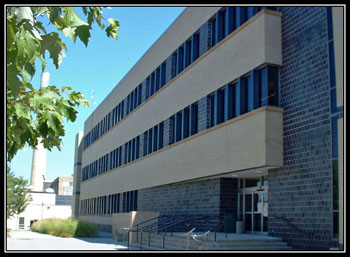
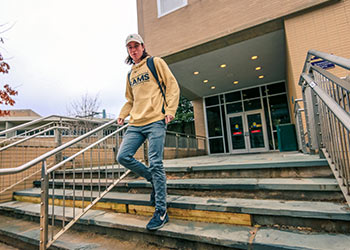
Research and Internships
Several options exist for undergraduate Biology students interested in pursuing research and/or external internships for credit. Students interested in these opportunities can find more information here.
Are you looking for a Summer Research Internship in STEM? Start here!
Biology Diversity, Equity, and Inclusion Suggestion Box and Help Tool: Follow this link to drop a note in our online suggestion box, get more information about the Biology department DEI committee, or connect to resources that can help solve problems.
Research Opportunities
Plastic Pollution On Campus and in Local Streams
The Aquatic Ecosystems Lab at WCU is seeking at least four undergraduate students to participate in a study about plastic pollution on campus and in local streams, beginning August 2023. Interested students should schedule a meeting during Dr. Fork's office hours to discuss the project and their questions. More information at https://aquaticecosystemswcu.weebly.com/opportunities.html
More Opportunities
For more information, please see the Faculty page.
You can also view the faculty research slideshow for more information on ongoing faculty research.
Contact Information
- Dr. Chandler, Department Chair
610-436-1023 - Dr. Maresh, Assistant Chair
610-436-2318 - Dr. Turner, Graduate Coordinator
610-436-3009 - Melissa Griffin, Administrative Assistant
610-436-2538
The Department of Biology office is located in Room 175 on the first floor of Science North.
Faculty office hours for Spring 2026 .
Recent Alumni

